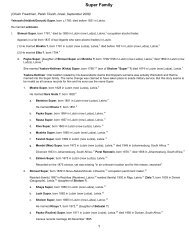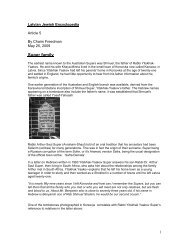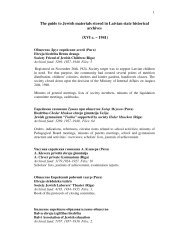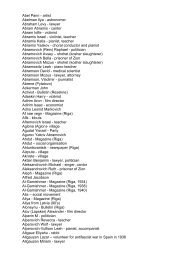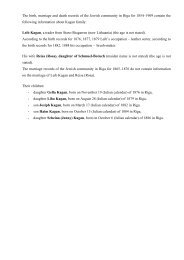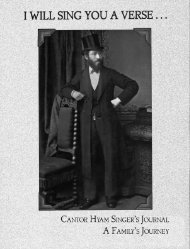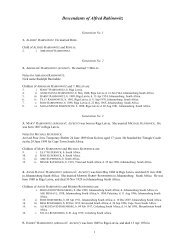Small Riga Ghetto
Small Riga Ghetto
Small Riga Ghetto
You also want an ePaper? Increase the reach of your titles
YUMPU automatically turns print PDFs into web optimized ePapers that Google loves.
190<br />
Jews did not regret this death in the least, for we had not forgotten various<br />
things Haar had done to us during those difficult times. The following morning<br />
Sauer showed up to investigate the incident, but the investigation came to nothing.<br />
Haar was wrapped in a paper sack like the other corpses and taken to the<br />
Matīsa Cemetery to be buried.<br />
At the end of January 1944 the director of the Heereskraftfahrpark or HKP<br />
(Army Vehicle Park) was brought to the concentration camp. A new department<br />
of the HKP, called the Park, was established, and I was appointed to be<br />
the foreman of the work crew. I did not want to accept this position under any<br />
circumstances, although the conditions in Kaiserwald were especially bad at<br />
that time. But the misery and suffering there gave me no rest. There was no<br />
help for it, I had to go. In the evening, when all the inmates of our barrack had<br />
gathered together and everyone knew I was about to leave Kaiserwald, the<br />
German Jews started to thank me with long speeches for all the good I had<br />
done them, and they were followed by all the others. Afterwards, as I spoke a<br />
few words of farewell all of the barrack's inmates stood up as one. Tears<br />
choked my voice and I could scarcely speak. What I had done was my duty,<br />
but unfortunately I could not fulfill it as I had wished to do. I saw before me<br />
the sick people lying in the clinic. The next day they would wait in vain for a<br />
bit of hot food.<br />
But I could not stay. I was compelled to leave Kaiserwald, and I thought that<br />
perhaps in my new position I could once again do just as much for my brothers<br />
as before. "Very many" of those who were in my block at that time, and with<br />
whom I shared countless difficult experiences, survived – that is to say, one<br />
single comrade, Niburg, and I.<br />
While I was writing this chapter, I happened to meet Niburg again here in<br />
Germany. I invited him to visit me and I read these lines aloud to him. Because<br />
we were the only surviving witnesses of those events, that time appeared<br />
again clearly before our eyes.<br />
The next morning I was taken away to my new work place. I did not return<br />
to Kaiserwald until about three quarters of a year later, as a hostage.<br />
XX.<br />
The mortality rate in Kaiserwald was especially high until the spring of 1944.<br />
Several small transports of children and older people to Treblinka and Auschwitz<br />
took place. * The summer was somewhat easier in the camp, and the camp<br />
* [Ed.: The transports went to the forest, not to Treblinka or Auschwitz. The Treblinka extermination<br />
camp had been liquidated in early fall of 1943, and Auschwitz in 1944 was bursting



